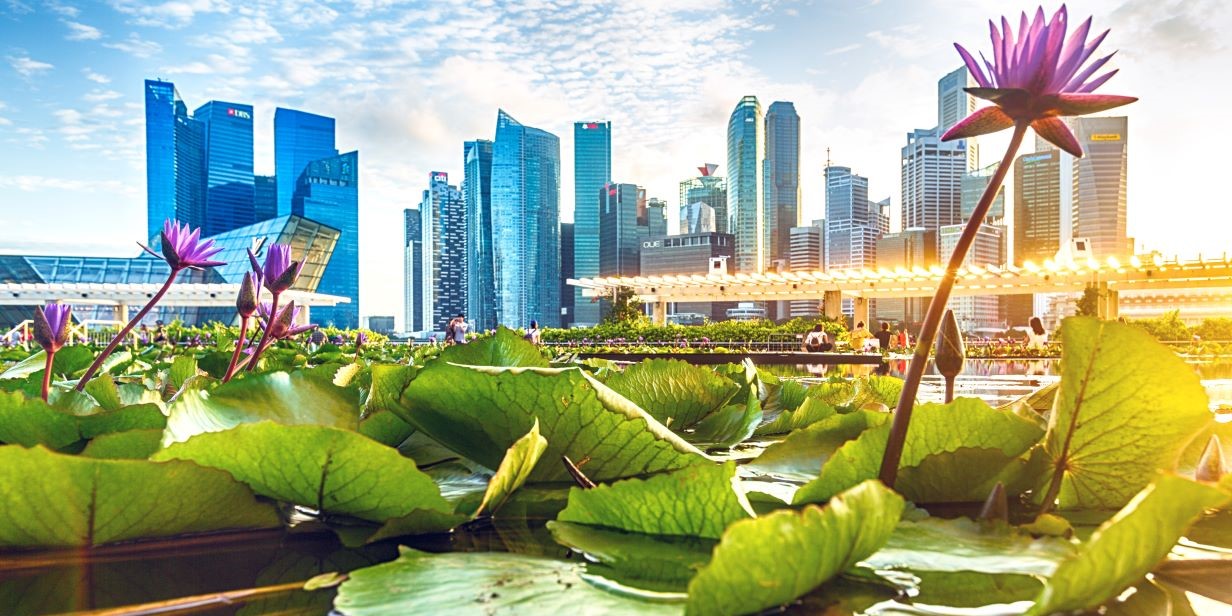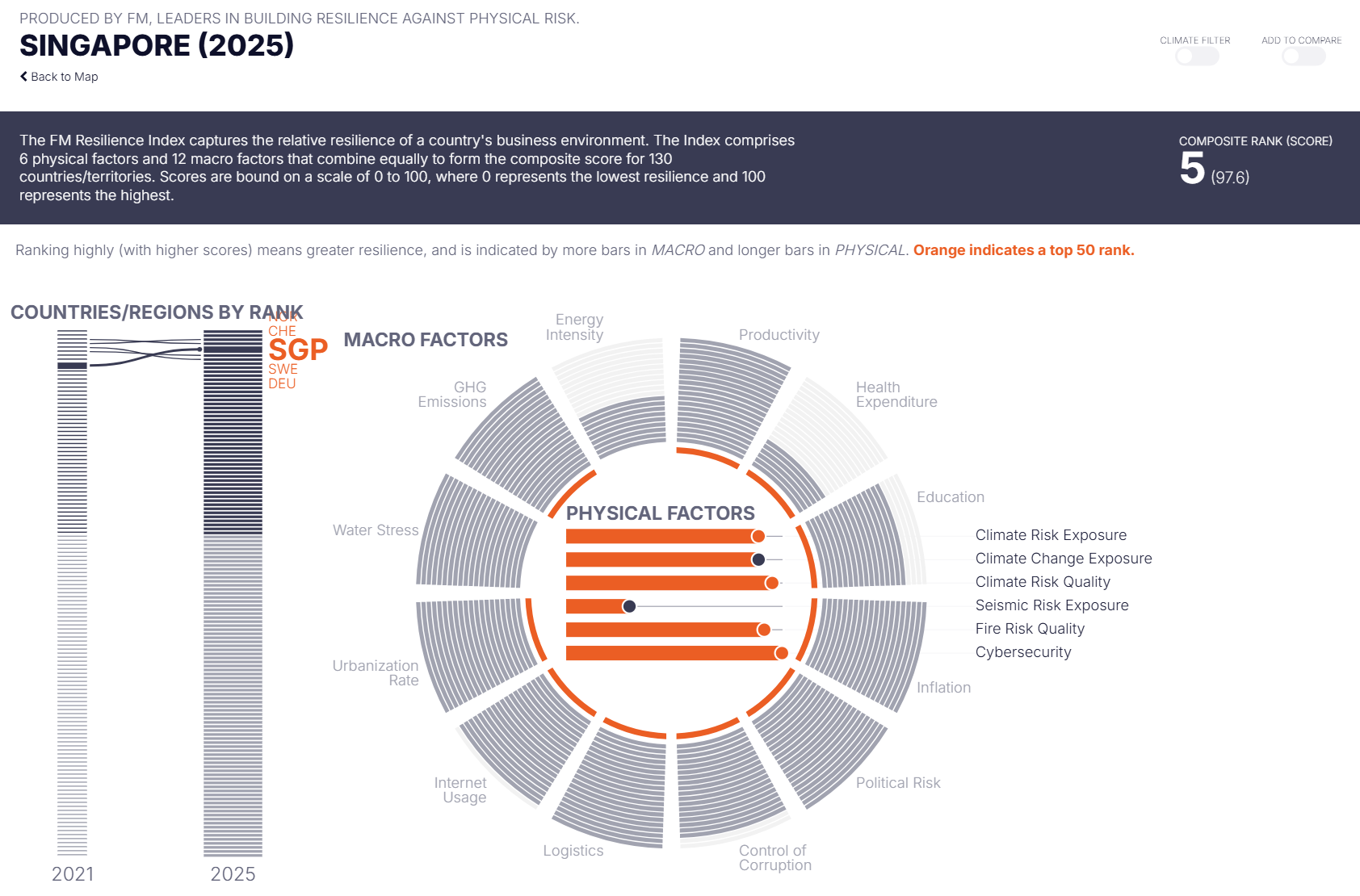Singapore: A global exemplar by so many resilience measures

In this series, we take a closer look at how key countries and territories ranked in this year’s FM Resilience Index. The FM Resilience Index is a tool developed to help understand a country’s vulnerability to disruptive events and its ability to recover swiftly, as well as which risks are manageable. The index provides a comprehensive risk assessment of 130 countries and territories.
For anyone who has landed at Singapore’s impressive Changi Airport, deplaned and found themselves in a taxi in what seems like mere minutes, there is something so well organised, so well designed, and so well followed about Singapore; and it flows through the people, the food, the architecture and the economy.
The tiny island city-state is an economic powerhouse, a smart city that has leveraged innovation for the good of its citizens and prioritized political stability to take a long-term view to transforming society and the economy. It’s a fiercely proud, multicultural population who see programs like military service, universal healthcare, education and environmental sustainability as nation builders, for a society so differentiated from its Asian neighbours.
The results speak for themselves in this year’s FM Resilience Index, with Singapore ranked in the top 50 nations in all but a handful of categories. It leads the table on minimizing political instability, urbanization and logistics. It shines when it comes to other macro factors too, including productivity (2), control of corruption (5), health spending (20) and education (31).
Singapore's economic resilience strategy focuses on fostering innovation, digital transformation and workforce development. The government is allocating significant funds to bolster key sectors such as technology with the Government Technology Agency of Singapore’s digital transformation of public services; infrastructure, as it continues to enhance its status as a leading maritime and aviation centre with a commitment to net-zero emissions by 2050; and biomedical sciences, with Phase 2 of Singapore's Biomedical Sciences Initiative focusing on positioning Singapore as a medical hub.
To ensure a competitive workforce, Singapore has expanded its SkillsFuture initiative, providing additional support for mid-career workers to reskill and transition into emerging industries. The Progressive Wage Credit Scheme has been enhanced to uplift lower-income workers while maintaining productivity gains. These measures aim to create a more inclusive economy where businesses and employees can thrive together.
Singapore continues to maintain its reputation for low corruption and high political stability, which are key factors in its overall resilience. The government's commitment to effective governance remains strong, contributing to the nation's ability to attract investments and maintain its position as a global financial hub.
Singapore places great emphasis on digital connectivity and cybersecurity. The country boasts high internet penetration rates and continues to invest in digital infrastructure to ensure widespread access and reliability. It achieved a cybersecurity rank of 4 in this year’s Index. Singapore is known for its quality healthcare, and like many nations, public health services may start to feel the strain of an aging population.

The National Health expenditure is projected to increase to S$59 billion by 2030, accounting for up to 9% of GDP. To address this, the government has allocated a S$5.6 billion budget for healthcare infrastructure, delivery and managing issues related to an aging population.
Singapore’s compact geography and lack of natural resources make its success all the more impressive but also points to vulnerabilities when it comes to physical resilience.
Climate change is a particular concern, with Singapore receiving a rank of 49 for climate risk exposure and 55 for climate change exposure this year. The Third National Climate Change Study (V3) projects higher temperatures, more extreme weather events and accelerating sea level rise by the end of the century. Most recently evidenced by the November 2024 flash floods and the January 2025 monsoon surges where heavy rain was at historic levels.
To combat these threats, Singapore has launched a S$25 million Weather Science Research Programme to improve extreme weather prediction capabilities. The government has also injected an additional S$5 billion into the Coastal and Flood Protection Fund, demonstrating a long-term commitment to safeguarding the nation against rising sea levels.The city-state is actively working to mitigate urban heat island effects through increased greenery and innovative solutions like cool paint on building facades. Singapore is also investing in clean energy and decarbonization efforts, with the Future Energy Fund receiving a S$5 billion top-up to support the transition to renewable energy sources.
Water stress is also an issue (rank 115). The nation continues to invest in water security through its Four National Taps strategy, which includes water from local catchments, imported water, NEWater, and desalinated water.
In terms of energy, Singapore is actively working to reduce its energy intensity and diversify its energy sources, exploring options such as low-carbon hydrogen and nuclear energy. Singapore’s energy intensity remains high (111) but it's decarbonization efforts have paid off with a greenhouse gas emissions rank of 8.
So where to from here? Singapore's approach to resilience in 2025 is comprehensive and forward-thinking, addressing a wide range of challenges from climate change to economic stability. Finishing number 1 globally seems realistic, considering all the progressive work that is still to be completed. With a sense of pride and purpose, from the smallest hawker market to the largest luxury goods mall, it seems that Singapore has cemented its position as a leader in the FM Resilience Index for years to come.
